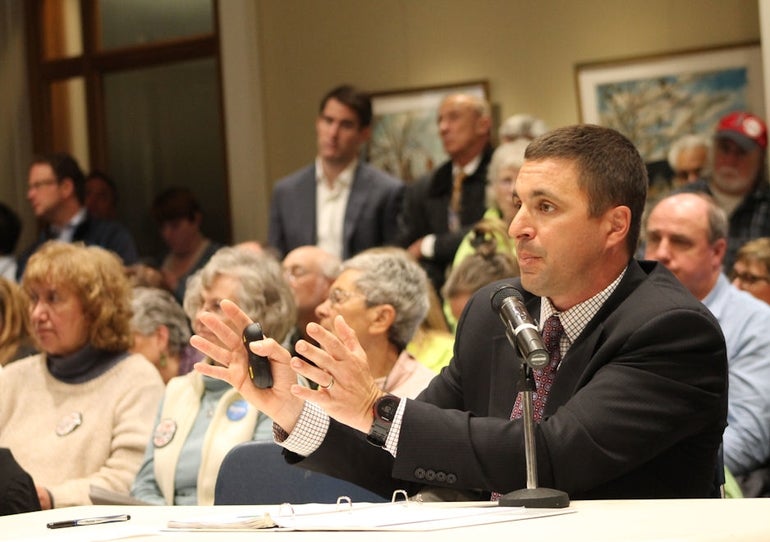In the wake of the suspension of Kinder Morgan’s major natural gas pipeline project in Massachusetts and New Hampshire, the Baker administration’s energy chief on Tuesday stressed that “incremental” increased natural gas capacity continues to be a necessary component of its plan to meet demand and control cost in an environmentally friendly way.
Energy Secretary Matthew Beaton, testifying before the Senate’s Committee on Global Warming and Climate Change, detailed for lawmakers how during times of peak demand during cold winter weather the percentage of oil-generated electricity in Massachusetts spikes dramatically to meet demand.
The reliance on oil to meet that demand, according to Beaton, has impacts not just on cost, but on the state’s ability to meet its greenhouse gas emission reductions goals.
“Let me make this really abundantly clear. This is not just about cost. Certainly cost is an integral piece in all of this, but it is that interweb of those three items that I keep hammering on of cost, carbon and reliability and simultaneously taking incremental steps forward to address all of those issues in the smartest, most economically responsible way possible,” Beaton said.
The message, however, bumped headlong against hundreds of protesters who turned out at the State House on Tuesday and later filled the committee hearing room to oppose new natural gas pipelines. With Massachusetts already heavily dependent on natural gas, those critics instead would like to see a more focused effort on energy efficiency and renewable sources like wind and solar to meet demand.
Sen. Marc Pacheco, a Taunton Democrat who chairs the committee, expressed his disappointment that Kinder Morgan, who announced two weeks ago that it was suspending work and spending and its Northeast Energy Direct pipelines due to unfavorable market conditions, declined an invitation to appear.
“They have, I guess, refused to attend the hearing and answer questions from this committee,” Pacheco said. “We had questions relative to the suspension and what it really meant that we would like to have answered by them.”
Kinder Morgan, in a statement, said it declined the invitation in light of the project’s suspension and the company’s focus “on a contractually required period of confidential discussions with local natural gas companies in Massachusetts and New Hampshire that had committed to purchase gas from the project.”
With the focus shifted off Kinder Morgan, members of the committee took a broader approach to questioning the administration about its views on natural gas, including the numerous studies on the topic that have come to varying conclusions about the need for expansion.
Sen. Jamie Eldridge asked how increasing reliance on natural gas would fit into carbon emission reduction goals, while Pacheco questioned whether the Baker administration, through the Department of Public Utilities and other agencies, engaged closely enough with the Federal Energy Regulatory Commission over the Kinder Morgan pipeline.
He referenced other states, such as New York and Maine, who have taken proactive steps to protect state interests despite FERC control over the eventual permitting.
Beaton said the administration had as much involvement with FERC as allowed by law, and told Pacheco that the examples he cited in New York and Maine of permits and certificates dealing with water quality being denied by the state were “two completely different issues” that never came up in Massachusetts.
The Baker administration continues to push its plan to import large-scale hydropower as part of strategy that, to a lesser extent, would also embrace new off-shore and land-based wind resources and solar. With the adoption of the governor’s plan, Beaton said the state could “blow our goals out of the water” with regard to carbon emission reductions.
Without hydropower, Beaton warned that the state could miss its targets or “get pretty darn close and eke it out, maybe.”
Beaton, however, said the impending retirements of roughly 10,000 megawatts of generation, including 680 megawatts of clean nuclear power from Pilgrim Nuclear Power Station, requires a mix that includes gas.
“The sun isn’t always shining. We can’t depend on solar in moments like right now,” Beaton said, referring to the gray skies over Boston this week.
When Pacheco referenced a study commissioned by Attorney General Maura Healey that concluded the state’s energy needs could be met with increased energy efficiency and without new gas pipelines, Beaton questioned Healey’s assumption.
Beaton said the conclusions in the attorney general’s report relied on energy efficiency goals that exceed even the state’s most ambitious goals, and would require the cooperation of other New England states to reduce demand.
“It is an unrealistic number that we can’t feasibly attain,” Beaton said.
Pacheco, referencing what countries like Portugal and Denmark have done to decrease reliance on fossil fuels, replied, “If I’m anything at all, it’s impatient.” He added, “I want to go as fast as we can.”
Sen. Michael Barrett asked Beaton if the administration could present alternative energy mixes to the one embraced by the governor’s team so that the Legislature could weigh the pros and cons just as Beaton had before settling on a plan.
Rebecca Tepper, chief of the attorney general’s energy division, acknowledged some of Beaton’s concerns with the attorney general’s report, but questioned whether the state was thinking big enough around energy efficiency.
“We get it that we’re all working really hard on energy efficiency, but what would it look like if we double down?” Tepper said.
Tepper also said that Healey’s office was “pleased” that Kinder Morgan suspended its Northeast Energy Direct project, and continues to explore whether bids before the DPU from National Grid and Eversource to lean on ratepayers to finance a different pipeline – Access Northeast – are in the public interest.
As lawmakers prepare for a debate this spring over major energy legislation that is expected to call for long-term procurement of clean energy resources, Tepper urged them to build in protections for ratepayers, including making sure the procurement is “not too big” and fully transparent with an independent evaluation process for bids.

